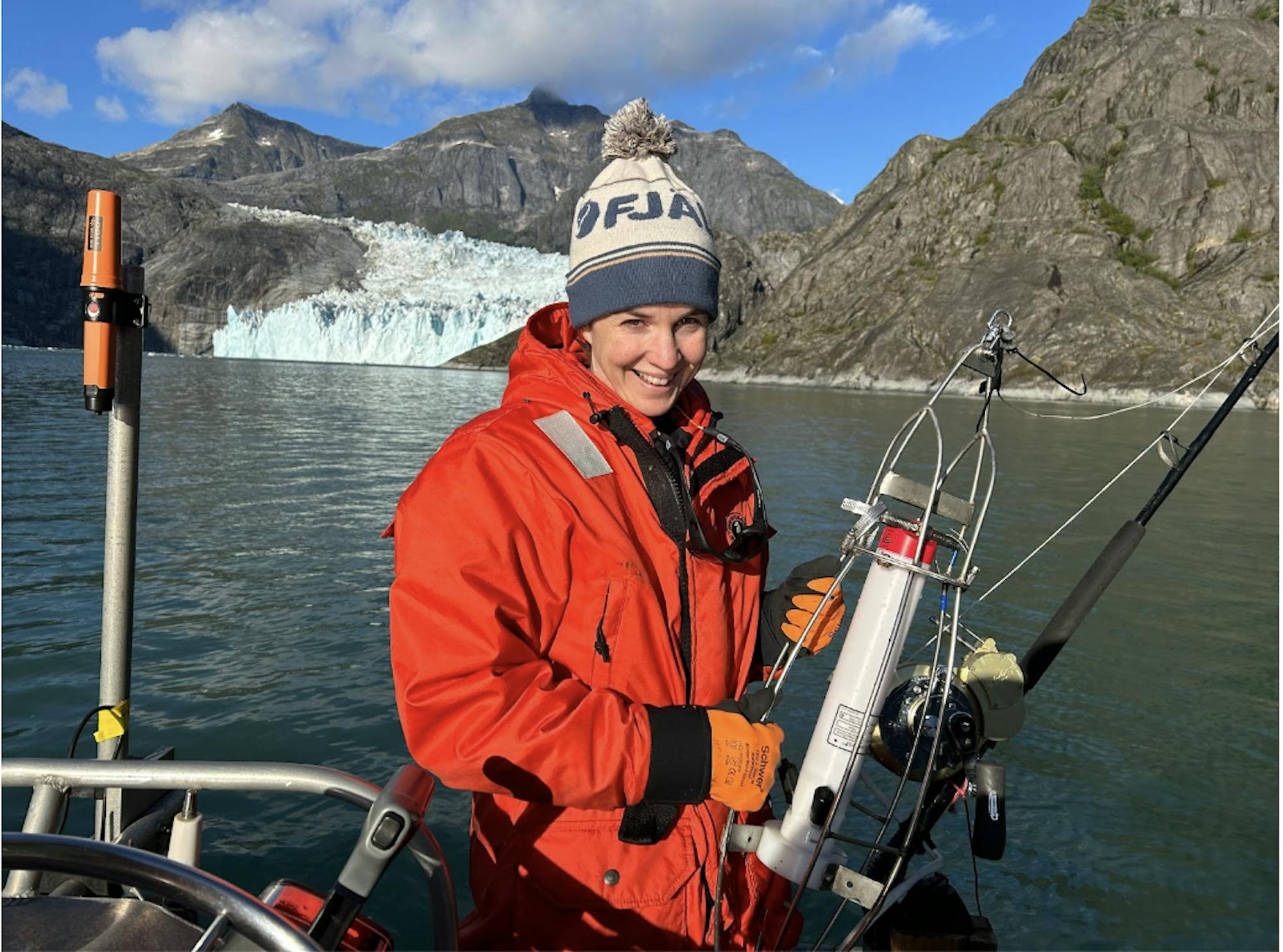While most professors started their fall semester in Medford/Somerville classrooms, Rebecca Jackson, Tufts’ new assistant professor of Earth and climate sciences, found herself in the glacial fjords of Alaska, studying the interaction between glacial ice and the ocean.
Jackson comes to the hill from the Rutgers University Department of Marine and Coastal Sciences, where she taught for four years. After returning from Alaska a few weeks into the fall semester, she joined her students on campus. Jackson is currently teaching Introduction to Oceanography, a discipline that plays heavily into her research.
Jackson’s work examines how fast glaciers are melting underwater, which subsequently affects rates of glacial retreat and sea level rise. Jackson enjoys her research not only because of its fascinating subject matter, but also because of the collaboration that goes into it.
“My favorite thing is the team aspect of this sort of work; it’s incredibly interdisciplinary,” she said.
The research team relies on a wide variety of specialties from oceanography to engineering to measure data. This fieldwork takes Jackson to the foot of glaciers where they meet the sea in Greenland and Alaska.
“It’s totally gorgeous and dramatic and icy,” she said.
But it’s also dangerous due to the risk of ice calving — when large chunks of ice break off from the glacier’s edge, plummet into the water below and trigger a massive wave. Therefore, Jackson’s team must stay far away from the ice, but there are still ways to creatively get data.
Jackson’s team, in collaboration with Rutgers University, Oregon State University and the University of Oregon, sends out autonomous boats which distribute remotely operated vehicles to measure the ice.
“It’s kind of a robot deploying a robot,” Jackson said.
She hopes to use this data to better understand climate change’s effect on glaciers.
“One of the big motivations for this research is to be able to predict how glaciers are going to continue to change going forward,” Jackson said. “You can see that they’re shrinking … and that’s causing sea level rise.”
The goal is to have a better understanding of glacial melting, which will then help generate more accurate models of predicted sea level rise.
This work is cutting edge.
“We’ve actually never been able to get measurements in these sorts of fissure systems [before] because you can’t take people there,” said Jackson. “These are all brand new technologies.”
Even with new tools, environmental fieldwork is not without its pitfalls.
“Usually when you go do work in polar ice regions, you break instruments, you lose things, it’s just such a difficult environment,” said Jackson.
Visiting places like Alaska and Greenland also makes it easier to see the physical effects of climate change on the landscape.
“You can see how dramatically climate change is happening … in a more visceral way,” Jackson said. “Working in the polar regions gives you a sense of urgency.”
Despite the team’s finding that melting is occurring faster than previously predicted, Jackson is not a climate nihilist.
“I think what’s happening is dramatic, and it’s a huge challenge for our global community,” she said. “But I think the last thing we should do is throw up our hands and say we can’t do anything about it. We know there are things we can do about it.”
Jackson did not set out to become a climate scientist. Originally from the Greater Boston area, she earned her bachelor’s degree in physics at Yale, where fluid dynamics and physical oceanography captivated her towards the end of her undergrad years.
“That really caught my interest and combined my interest in math and physics with a budding, growing interest in earth science and climate science,” Jackson said.
Jackson went on to achieve a Ph.D. in physical oceanography from a joint program between the Massachusetts Institute of Technology and the Woods Hole Oceanographic Institution on Cape Cod, followed by a postdoctoral fellowship from the National Oceanic and Atmospheric Administration.
No longer a student, Jackson now enjoys academic life from the teaching perspective as well.
“Being a professor is sort of a unique opportunity to both teach and do research,” she said. “You also get to teach through research sometimes by bringing students into your research group.”
For those not ready to take to the polar seas, Jackson’s two brand new course offerings in the spring, Physical Oceanography and The Cryosphere, offer opportunities to learn about ice and the oceans. Neither class has ever been taught at Tufts, and will count towards a new Climate Science major which will soon be available to undergraduates.
Jackson recommends the courses for students across any science or engineering disciplines.
“It’s such an exciting way to basically take some of the math and physics that many science majors have been learning and really apply it to a real-world, exciting, interesting system, which is the ocean,” she said.
Despite the challenges of balancing a full schedule of research, parenting two toddlers and teaching, Jackson has enjoyed her time at Tufts so far.
“I’ve been really impressed with how engaged and enthusiastic the Tufts student body is,” she said. “I love being on campus, it’s a beautiful campus. It’s nice to be back in my hometown area.”
But as Jackson settles into life at Tufts, she already has her eyes on the future. In fact, Jackson is looking for undergraduates to join her research team, and will be returning to both Alaska and Greenland next summer to continue her work gathering data that scientists will hopefully be able to use to protect our planet.
“The sea level rise that we’re going to see in the coming decades and centuries is going to be a result of what we choose to do right now,” Jackson said. “We really have agency to do better and to change our course.”






